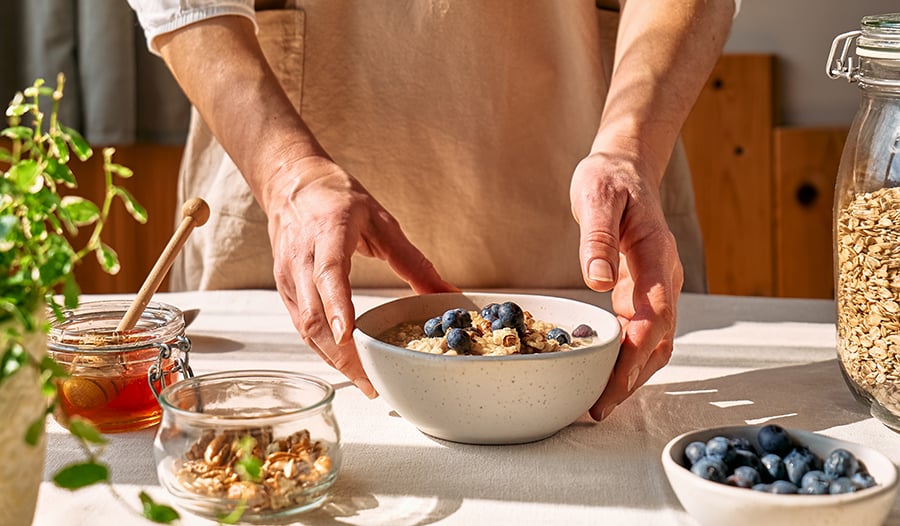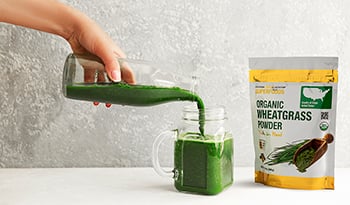20 high-fibre foods to add to your diet, according to a dietitian

Key takeaways
- Fibre is crucial for digestive health, blood sugar control and maintaining a healthy weight.
- Women should aim for about 25 grams of fibre per day and men about 38 grams.
- Legumes (beans, lentils), fruits (berries, pears), vegetables (broccoli, artichokes) and whole grains (oats, quinoa) are some of the best sources.
- A simple way to boost your intake is to add a tablespoon of chia seeds or flaxseeds to your smoothie or yoghurt.
What is fibre?
Dietary fibre, also known as bulk or roughage, is a type of carbohydrate that the body cannot digest. Fibre is found mainly in fruits, vegetables, nuts, seeds, legumes and whole grains. Consuming adequate dietary fibre can help support healthy, regular bowel movements, heart health, gut health and weight management and may lower your risk of diabetes.
Types of fibre
Fats, proteins and carbohydrates are macronutrients that the body breaks down and absorbs for energy. Dietary fibre is unique in that the body cannot digest or absorb it. There are two types of fibre: soluble and insoluble fibre. Some foods contain both soluble and insoluble fibres.
Soluble
Soluble fibre dissolves in water. When dissolved in water, soluble fibre creates a gel-like consistency that improves the shape, size and texture of stool, helping to ease the passing of bowel movements. Soluble fibre may also support gut health by increasing the beneficial bacteria in the intestines.1
These foods are excellent sources of soluble fibre:
- Oats
- Apples
- Carrots
- Citrus fruits
- Psyllium
- Beans
- Apricots
- Ground flax seeds
- Sunflower seeds
- Sweet potatoes
- Avocados
Insoluble
Insoluble fibre does not dissolve in water. This type of fibre can accelerate gut transit time, easing the movement of stool through your digestive tract.2
The following foods are rich in insoluble fibre:
- Apples, with skin
- Pears, with skin
- Beans and lentils
- Berries
- Wholemeal flour
- Wheat bran
- Cauliflower
- Potatoes
- Spinach
- Okra
- Dried apricots, raisins, prunes and dates
- Almonds
- Walnuts
- Popcorn
What are the health benefits of fibre?
Fibre has many health benefits. Some of the key health benefits of fibre include:3
- Helps prevent and treat constipation
- Helps slow down the absorption of carbohydrates and sugar, which helps maintain healthy blood sugar levels
- May help reduce the risk of colorectal cancer
- May help manage weight by improving satiety and helping you feel fuller longer
- May reduce the risk of diverticulitis
- Increases microbial diversity in the gut, supporting overall gut health
How much fibre should I eat per day?
The American Heart Association recommends eating 25 to 35 grams of fibre daily from food sources, not supplements. However, because the standard American diet is often high in low-fibre and processed foods, the average American adult does not meet this recommendation, consuming an average of only 15 grams of fibre daily.
20 high-fibre foods
Eating more fibre could not be easier – or more delicious. But you might be wondering, what foods are high in fibre? Luckily, many foods are naturally high in fibre. Add these high-fibre foods to your shopping list today to boost your fibre intake.
- Oats: oats contain both insoluble and soluble fibre. One half-cup serving of oats has 4 grams of dietary fibre. Oats also contain a type of soluble fibre known as beta-glucan, which may help reduce LDL ‘bad’ cholesterol levels and improve blood sugar control. Oats are delicious as porridge, overnight oats, in baked recipes and in the form of oat flour for baking.
- Sunflower seeds: sunflower seeds are a source of soluble fibre. One quarter-cup serving of sunflower seeds has 3 grams of dietary fibre and 6 grams of protein. Enjoy sunflower seeds on their own, in trail mix, on salads or on top of yoghurt.
- Ground flax seeds: one tablespoon of ground flaxseeds has 3.5 grams of fibre along with 2 grams of protein. Choose ground flaxseeds or buy them whole and grind them yourself. Ground flaxseeds are easier to digest and absorb, so your body gets all the nutritional benefits from the seeds. Ground flaxseeds are great on porridge, in smoothies or in baked recipes.
- Carrots: one cup of chopped carrots has 4.6 grams of fibre. Carrots also contain beta-carotene, which is converted to vitamin A to support eye health.
- Apricots: one apricot offers 2.1 grams of fibre. Dried apricots are another delicious way to boost fibre intake. Use dried apricots in homemade energy bites, granola or on top of porridge.
- Broccoli: broccoli is a cruciferous vegetable with many health benefits. One cup of raw broccoli has 2.4 grams of fibre. Enjoy broccoli raw or roasted as a side dish, in a stir-fry, in soups or diced and added to sauces.
- Lentils: a half-cup of cooked lentils contains 8 grams of fibre and 9 grams of plant-based protein. Lentils are also a great source of iron. Lentils work well in soups and are a yummy plant-based meat alternative for tacos, spaghetti and burgers. This is one of the best high-fibre foods you can find.
- Avocados: avocados contain both soluble and insoluble fibre. One serving of avocado, which is a third of the fruit, contains 4.5 grams of fibre. Enjoy a whole avocado and that’s 13.5 grams of fibre. Avocados are delicious as guacamole, sliced and topped on a salad, as a healthy spread for a sandwich or wrap, added to a smoothie or even in homemade desserts such as a chocolate avocado pudding.
- Sweet potatoes: one medium sweet potato has 4 grams of fibre, most of which is soluble fibre. Sweet potatoes also contain potassium, B vitamins and beta-carotene, which convert to vitamin A within the body. Sweet potatoes are delicious baked, mashed, as chips, as well as diced, roasted and topped on salads.
- Black beans: a half-cup serving of black beans has 7.5 grams of fibre along with 7.6 grams of plant-based protein. Black beans are also a source of iron. Black beans are great in soups, tacos, burgers, burritos, topped on a salad or served as beans and rice.
- Almonds: one 28 g serving of almonds – approximately 20 to 24 almonds – contains 3 grams of fibre and 6 grams of protein. Almonds are also rich in the antioxidant vitamin E. Enjoy almonds on their own, in trail mix, on top of porridge, yoghurt, on top of a salad and in baked recipes.
- Walnuts: one 28 g serving of walnuts – about 7 walnuts – contains 1.9 grams of fibre along with 4.3 grams of protein. Walnuts are also rich in omega-3 fatty acids, which may support brain and heart health.4,5 Enjoy walnuts on their own, topped on porridge or yoghurt, in trail mix, on a salad, in a smoothie or in baked recipes.
- Quinoa: one cup of cooked quinoa contains 5 grams of fibre and 8 grams of plant-based protein. Quinoa is a naturally gluten-free grain. While quinoa is technically a seed, it is cooked like a grain and often referred to as a grain. Enjoy quinoa as a side dish, in a salad or as hot breakfast cereal.
- Brown rice: a quarter-cup of dry brown rice has 3 grams of fibre. Rice is also a source of calcium, iron, manganese and magnesium. Enjoy rice as a side dish, in soups, as a hot breakfast alternative or in many lunch or dinner recipes.
- Chia seeds: just 2 tablespoons of chia seeds contain 9.8 grams of fibre and 4.7 grams of protein. Chia seeds are incredibly nutritious and a source of calcium, iron, magnesium, phosphorus, zinc, vitamin B1 and vitamin B3. Enjoy chia seeds in chia pudding, porridge, overnight oats, smoothies, jams, desserts and baked recipes.
- Pumpkin seeds: a quarter-cup of pumpkin seeds contains 1.7 grams of fibre as well as 8 grams of plant-based protein. Pumpkin seeds are also rich in antioxidants, iron, zinc and magnesium. Enjoy pumpkin seeds by the handful, in trail mix, on salads or in baked recipes.
- Guava: one small guava fruit has 3 grams of fibre. Guava fruits are also rich in antioxidants and vitamin C. Guava is delicious as a fresh fruit, topped on yoghurt, porridge, in cereal, smoothies, desserts and more.
- Strawberries: one cup of strawberries offers 2.9 grams of fibre. Strawberries are a low glycaemic food packed with vitamin C. Enjoy strawberries as they are, in smoothies, in baked recipes and in jams or sauces.
- Cauliflower: one cup of chopped raw cauliflower has 2.1 grams of fibre. Cauliflower is also an excellent source of vitamin C, folate (vitamin B9) and vitamin K. Enjoy cauliflower roasted as a side dish, topped on a salad, in mashed potatoes, pizza base or diced in tacos, burritos, hamburgers and more.
- Prunes: prunes are dried plums and a great way to boost fibre intake. A serving of five prunes provides 3 grams of fibre. Prunes are also a good source of vitamin A, vitamin C, vitamin K, iron, magnesium, copper and vitamin B6. Enjoy prunes as they are, in trail mix, baked recipes, granola, smoothies or diced and topped on cereal.
5 easy ways to add more fibre to your day
- Make a smoothie with fruits and vegetables such as bananas, spinach, berries, ground flax seeds and your favourite protein powder.
- Add spinach to a sandwich.
- Dice vegetables such as courgette, tomatoes or mushrooms and add to your favourite pasta sauce.
- Add lentils or black beans to your taco filling, homemade burgers or minced meat for spaghetti night.
- Grab a piece of fruit and pair it with nuts or seeds for a snack.
One of the easiest ways to boost your daily intake of fibre is to add more plant-based foods to your plate. Plant-based foods include fruits, vegetables, nuts, seeds, beans, legumes, whole grains, herbs and spices.
References:
- Guan ZW, Yu EZ, Feng Q. Soluble Dietary Fiber, One of the Most Important Nutrients for the Gut Microbiota. Molecules. 2021 Nov 11;26(22):6802.
- van der Schoot A, Drysdale C, Whelan K, Dimidi E. The Effect of Fiber Supplementation on Chronic Constipation in Adults: An Updated Systematic Review and Meta-Analysis of Randomized Controlled Trials. Am J Clin Nutr. 2022 Oct 6;116(4):953-969.
- Barber TM, Kabisch S, Pfeiffer AFH, Weickert MO. The Health Benefits of Dietary Fibre. Nutrients. 2020 Oct 21;12(10):3209.
- Dighriri IM, Alsubaie AM, Hakami FM, Hamithi DM, Alshekh MM, Khobrani FA, Dalak FE, Hakami AA, Alsueaadi EH, Alsaawi LS, Alshammari SF, Alqahtani AS, Alawi IA, Aljuaid AA, Tawhari MQ. Effects of Omega-3 Polyunsaturated Fatty Acids on Brain Functions: A Systematic Review. Cureus. 2022 Oct 9;14(10):e30091.
- Elagizi A, Lavie CJ, O'Keefe E, Marshall K, O'Keefe JH, Milani RV. An Update on Omega-3 Polyunsaturated Fatty Acids and Cardiovascular Health. Nutrients. 2021 Jan 12;13(1):204.
DISCLAIMER:This Wellness Hub does not intend to provide diagnosis...
















































































 Table of Contents
Table of Contents















